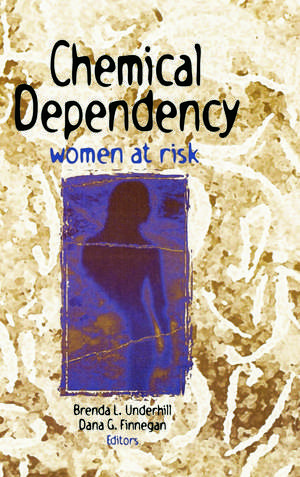Chemical Dependency: Women at Risk
Autor Dana Finnegan, Brenda Underhillen Limba Engleză Hardback – 16 dec 1996
Chemical Dependency offers a three-stage cultural assessment model that serves as a key starting point for transforming your services into culture-, gender-, and ethnic-sensitive programs. You’ll acquire the knowledge and skills necessary to develop recovery services that identify patterns of belief and customs that can assist or hinder women in achieving and maintaining recovery.
Readers of Chemical Dependency discover the obstacles to the development of effective women’s recovery programs, as well as key service elements of successful recovery programs. In addition, they witness firsthand how to integrate an understanding of women’s lives from a multigenerational and life span perspective with consideration of issues such as sexuality, violence and sexual abuse, and codependence and parenting. As a result, professionals in the field at all levels are equipped with the necessary know-how for providing services to underserved women and offering them the assistance they so desperately need to overcome their substance abuse problems.
Chemical Dependency provides readers with the most comprehensive analysis to date of marijuana addiction in women with effective methodss for outreach, intervention, treatment, and research. The techniques it offers for establishing discussion frameworks for sexuality and HIV in the context of recovery can be incorporated immediately into existing treatment programs, as can its strategies to assist lesbians and bisexual women in confronting the trauma they suffer as a result of addiction, sexism, and societal homophobia.
The book’s authors are professionals in the fields of treatment, research, prevention, community organizing, and policymaking. Readers acquire from their collaborative effort an understanding of alcohol and drug addiction as a complex ‘bio-psycho-social-spiritual’disease. Counselors, researchers, health care providers, and faculty and students of chemical dependency programs will find Chemical Dependency an invaluable guidebook for the development or improvement of their own approaches to successful intervention and treatment of women susceptible to drug and alcohol abuse.
Preț: 907.42 lei
Preț vechi: 955.17 lei
-5% Nou
Puncte Express: 1361
Preț estimativ în valută:
173.64€ • 181.75$ • 144.52£
173.64€ • 181.75$ • 144.52£
Carte tipărită la comandă
Livrare economică 31 martie-14 aprilie
Preluare comenzi: 021 569.72.76
Specificații
ISBN-13: 9780789000019
ISBN-10: 0789000016
Pagini: 206
Ilustrații: 1
Dimensiuni: 152 x 229 x 18 mm
Greutate: 0.48 kg
Ediția:1
Editura: Taylor & Francis
Colecția Routledge
Locul publicării:Oxford, United Kingdom
ISBN-10: 0789000016
Pagini: 206
Ilustrații: 1
Dimensiuni: 152 x 229 x 18 mm
Greutate: 0.48 kg
Ediția:1
Editura: Taylor & Francis
Colecția Routledge
Locul publicării:Oxford, United Kingdom
Public țintă
Professional Practice & DevelopmentCuprins
ContentsForeword
- Preface
- Elements of Effective Services for Women in Recovery: Implications for Clinicians and Program Supervisors
- Using the Relational Model as a Context for Treating Pregnant and Parenting Chemically Dependent Women
- Retaining Your Clients and Your Sanity: Using a Relational Model of Multi-Systems Case Management
- What Difference Does Culture Make? Providing Treatment to Women Different From You
- Chemically Dependent Lesbians and Bisexual Women: Recovery From Many Traumas
- HIV, Women, and Alcohol Recovery: Risks, Reality, and Responses
- Women’s Marijuana Problems: An Overview with Implications for Outreach, Intervention, Treatment, and Research
- Index
- Reference Notes Included
Notă biografică
Dana Finnegan, Brenda Underhill
Descriere
Chemical Dependency: Women at Risk shows readers how to design and implement drug and alcohol treatment programs that take into account not only gender but also the cultural differences among women. This authoritative book encourages professionals in the field—whether counselors, researchers, or health care providers—to abandon “one size fits all” treatment approaches that fail to address the individual needs of women undergoing substance abuse treatment. Instead, they learn to recognize and respect cultural and individual differences among women. Use this book as a guide for developing your own innovative multicultural treatment approaches to substance abuse.
